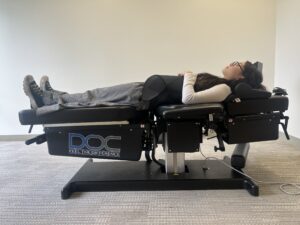Neuropathy is a prevalent ailment or disease that affects 8% of the U.S. population. That’s roughly 24 million individuals. Now, this is sufficient background information to begin discussing neuropathy and what doctors can do to treat this illness. At any age, peripheral neuropathy can emerge. It can affect both the older generation and the young but primarily affects us as we approach an advanced age. There are several neuropathy causes, with diabetes being one of the most prevalent. Diabetes is responsible for 30% of neuropathy cases. And idiopathic or undetermined disorders are responsible for the remaining 30%. Therefore, they know that diabetes is the leading cause of neuropathy. Now, diabetes can develop for a variety of reasons: High blood sugar, as well as genetic and metabolic variables.
Two forms of diabetes exist which are Type-1 and Type-2. Typically, type 1 diabetes is hereditary. Always, a genetic element is present in that. Type two diabetes is a lifestyle disease. This is when metabolic variables come into play.
However, regardless of the source of your diabetes, if it becomes severe and progressive, it can develop neuropathy in the hands and, more frequently, the feet.
What is Neuropathy?
In case of damage to the nerves which originate from the spine, patients can suffer from neuropathy. Consequently, the brain’s spine is comparable to the hard disc of a computer. All of these nerves originate from the spine and travel to various regions of the body, including the hands and feet. When this nerve is impeded by a variety of causes, such as an obstruction or something pinching the nerve, less information may travel to the hands and feet. This may result in a variety of symptoms that doctors refer to as neuropathy. Neuropathy can manifest as a sense of burning or tingling. It may be a sharp, piercing pain. There may be numbness. It can be a motor weakness, such as limb weakness or fatigue. There may be muscle pain. Therefore, all these are symptoms that a person with neuropathy may experience.
More posts we think you’ll like:
Does stress or any other factors also cause neuropathy?
Apart from Diabetes, people always have this question, to what extent is stress a factor for the perchance of neuropathy?
Stress is the main culprit of neuropathy. If you focus more on mental stress, there are slight chances it can be a cause of neuropathy, but most often, it exacerbates the situation over time. Now, physical stress on the body might occasionally induce impingement and neuropathy due to the high stress on nerves, which can lead to their damage if it persists in that manner. However, stress is unquestionably one of the elements that could aggravate your neuropathy or make you feel worse. Consequently, the specially designed program of doctors does include stress reduction or stress management assistance.
Outside of diabetes, neuropathy can develop because of:
- Infections
- Toxins
- Tumors
- Alcoholism
- Autoimmune disorders, such as rheumatoid arthritis
- Metabolic syndromes
- Trauma
- Chemotherapy
What are the early symptoms or warning signs of neuropathy?
There are a few early warning indicators of neuropathy. One of them is having a history of any autoimmune disorders or diseases that might be classified as diabetes. Consequently, if you have one of these illnesses, you might fall into the neuropathy group.
In terms of symptomatology, tingling and mild numbness in the hands and feet may be among the warning indications. It could also involve occasionally losing your balance while standing or walking. These would be typical early symptoms of neuropathy. Also, when you’re lying down or in bed, it’s not uncommon for your hands or feet to fall asleep for extended periods.
Stages of Neuropathy: From mild to severe
Yes, neuropathy is a disease that occurs in progression. There are 5 stages of neuropathy, and it is highly advisable to start treatment in the early stages of it. The following are the 5 stages of neuropathy:
Numbness and Pain
The beginning stages of neuropathy involve pain and numbness. These symptoms will not be permanent, but you will experience intermittent occurrences. These initial signs of discomfort and numbness may be modest, yet you will notice their presence. For instance, you may have mild tingling or numbness in your hands and feet, which will ultimately subside. You may notice that your equilibrium and reflexes are slightly off-kilter if we compare it with a typical state. Frequently, the first symptoms reoccur every few weeks and become steadier with time. Due to their subtlety, the initial indicators of neuropathy are frequently overlooked.
Regular and Persistent Symptoms
In the second stage of peripheral neuropathy, pain and numbness become more consistent and regular. It is difficult to identify exactly when a patient’s neuropathy advances to the second stage. Still, it will become apparent when the patient experiences pain and numbness more frequently than before. In the second stage, it becomes increasingly impossible to ignore the present pains, numbness, and other symptoms. At this moment, many individuals sense that something may be wrong and seek medical assistance. If the treatment of neuropathy begins in the second stage, there is a chance of reversal of nerve damage; however, if neuropathy is left untreated after the second stage, nerve damage is frequently irreversible.
Debilitating Pain
In the third stage of neuropathy, you experience discomfort every day or nearly daily. In this stage, the pain begins to interfere with your regular activities and hinders you from functioning normally. At this time, you may realize that over-the-counter pain drugs are no longer effective, and you are unable to obtain relief. This is because, in the third stage of neuropathy, you are likely to have further nerve damage sensations and symptoms. In the third stage also, it is possible to reverse some nerve damage, but in the majority of cases, nerve damage is irreversible.
Constant Numbness
In the fourth stage of neuropathy, the patient’s legs and feet become extremely numb. This is due to a shortage of healthy nerves capable of transmitting impulses to the brain. You may experience a rise in numbness and a decrease in pain, neither of which is desirable. This is a symptom that the nerves are dying, and the majority of nerve fibers have been destroyed when this occurs. At this stage, the bigger nerve fibers have begun to sustain irreversible damage. During this stage, your equilibrium is likely to be compromised, and it may become difficult to walk while maintaining your balance. In the fourth stage of neuropathy, nerve loss is irreparable, and the majority of numbness is irreversible. At this stage, it is imperative to seek therapy to prevent the irreversible worsening of numbness. In the fourth stage, there may be a fair opportunity for improvement.
Complete loss of feeling
This is the concluding step of neuropathy, which occurs when the lower part of the legs and feet has lost all sensibility. You experience no pain, only tremendous numbness. This is because there are insufficient nerves capable of transmitting signals to the brain. At this point, walking has become quite difficult, and your equilibrium is seriously impaired. You may become so unstable as to require the use of a wheelchair. If you have reached this level of neuropathy and have completely lost sensation in your lower extremities, you must seek emergency medical assistance. In stage five, nerves are irreparably destroyed; however, regeneration of certain nerve fibers may be feasible.
So, these are the five stages of neuropathy as it progressively gets worse.
To get to the root cause of pain and discomfort, schedule an initial consultation, including a comprehensive evaluation and first treatment.
Diagnosis of Neuropathy
Neuropathy can be clinically diagnosed. It is based on the response given by the patients, generated by using various mechanisms.
Therefore, in the clinic, there is a technique that each patient must undergo to determine the loss of sensory nerves. Doctors usually examine what percentage of sensory nerves have been lost. For that, they put patients through a series of field tests in which patients are essentially asked to rate their level of awareness. It can be done through various mechanisms. It can be cold therapy, hot therapy, a sharp push, or a dull push. Consequently, according to the response of patients, they gather data and empirically determine the treatment procedure. They also constantly compare the results of our examinations to what a natural sensation might feel like.
How does Diabetes Neuropathy originate?
Apart from Type I Diabetes which is caused due to genetic factors, the inception of Type II diabetes can be traceable. Diabetic neuropathy due to Type II diabetes begins in the gastrointestinal tract. It depends on our dietary habits, and certain lifestyle circumstances are typically to blame. What are you consuming throughout the day? How are you spacing your meals, and what are you eating? Are you physically active or increasingly sedentary? Consequently, these variables can all contribute to the onset of diabetic neuropathy.
How to cure Diabetic Neuropathy? Is it curable?
Diabetic neuropathy or diabetes in general is a disorder that requires lifelong management. Diet and lifestyle will serve as the therapy’s base. Can you eliminate the neuropathy associated with diabetes? Yes and no. In other words, once you’ve lost feeling or sensation in your nerves, there is no turning back. Therefore, doctors want to be able to detect it before it reaches this stage so they can begin to halt the process and reverse the nerves’ degeneration. For the diabetes problem, the goal is to maintain a healthy lifestyle. This would include any dietary modifications, additional supplements, workouts, and stretches the patient is comfortable with.
Treatment for Neuropathy in feet and legs
Everyone has a unique genesis for the onset of their neuropathy. As previously indicated, thirty percent of neuropathy is unknown. The amazing thing about the medicine that doctors provide is that it treats the majority of kinds of neuropathy. Of course, they evaluate you in the clinic to determine if you are a good candidate for art therapy. Still, there is a fundamental aspect of the therapy that applies to all types of neuropathies. The three primary components of art therapy are the in-clinic component and the at-home component, where at-home components can stimulate and rebuild nerves and nourish them. And the third portion will be the nutrition portion, which will aid improve circulation to the rest of the body and provide the nutrients to feed the nerves to keep them healthy.
Thus, a three-pronged approach is necessary to effectively halt neuropathy and initiate the reversal process.
Complications resulting from Neuropathy
There are a few, and if neuropathy has been present for some time and has taken root, the nerves may begin to die. Further, chronic pain, GI or gastrointestinal issues, dizziness or vertigo, and urinary or sexual problems are all possible consequences.
Occasionally, this could manifest as a total or partial lack of sensation in the feet or hands at that location. In such conditions, amputation is often a possibility, which, of course, is something you never want to achieve. Therefore, you should visit the clinic as soon as possible to begin treatment for this illness before you reach the point of requiring surgical intervention.
Why is early treatment essential in the case of Neuropathy?
The vast majority of patients have already gone to other doctor’s offices or clinics and have received medicine, or their primary care physician has sent them to a podiatrist or neurologist for treatment. They’ve tried everything and still haven’t found relief. This is because the information they’ve received has failed to address the root cause.
You have to figure out what your nerves are lacking and give it back to them, and if you do that, they’ll come back to life again. However, “the point of no return” can exist. Neuropathy can put people in wheelchairs and even necessitate amputations in the worst-case scenario. You need to do two things if you are going to solve the situation. Ensure that the nerves are getting the blood supply they need while they’re recovering by stimulating their growth and restoration.
As a result, it is critical to begin treatment for Neuropathy as soon as possible.
What are the varieties of treatments which can be offered?
In addition to pharmaceuticals that are used to treat disorders that are related to peripheral neuropathy, the following medications are used to treat the signs and symptoms of peripheral neuropathy:
- Pain relievers
- Antidepressants
- Topical treatments
- Anti-seizure medications
How does the conventional route of medicine treat the situation?
There are many prescription drugs for nerve pain caused by diabetes, but not all of them work for everyone. Consult your doctor about the pros and cons of any medicine you’re thinking about taking to figure out what might actually work for you.
What are the differences between a conventional route and Chiropractic treatment?
The standard medical approach is to begin treating individuals with neuropathy with medicine in the hopes that their symptoms may go away on their own. Sadly, this is not the case at all. Neuropathy usually gets worse. Neuropathy progresses so rapidly that it necessitates a second and then a third round of treatment from a doctor who will prescribe further pills to numb the symptoms but will never find out what is the root cause of them. It only works like a band-aid treatment to cover up neuropathy as it progresses.
Medications, Topical creams, and Anti-depressants are also used to help with the mental aspect of it. And it’s just a cascade of going down this rabbit hole of covering up the symptoms.
While at our Chiropractic clinic in San Francisco, we want to get to the root of the issue, start to help with your pain in a more natural way without the drugs and the surgery, and help you get your life back and to be able to go back to doing the activities that you’d love to do, which could mean something like going back to work or simply being able to do chores or going back to a favorite sport like activity.
To get to the root cause of pain and discomfort, schedule an initial consultation, including a comprehensive evaluation and first treatment.
The final word from the expert
So if you or your loved one. Is suffering from neuropathy. Whether it’s from diabetes or any other condition, give us a call today so we can help you reduce your pain levels and get you back to doing what you love.
With early detection of Neuropathy symptoms, chiropractic care can help to cure neuropathy and maintain diabetes with proper diet and lifestyle. To get to the root cause of pain and discomfort, schedule an initial consultation, including a comprehensive evaluation and first treatment.



